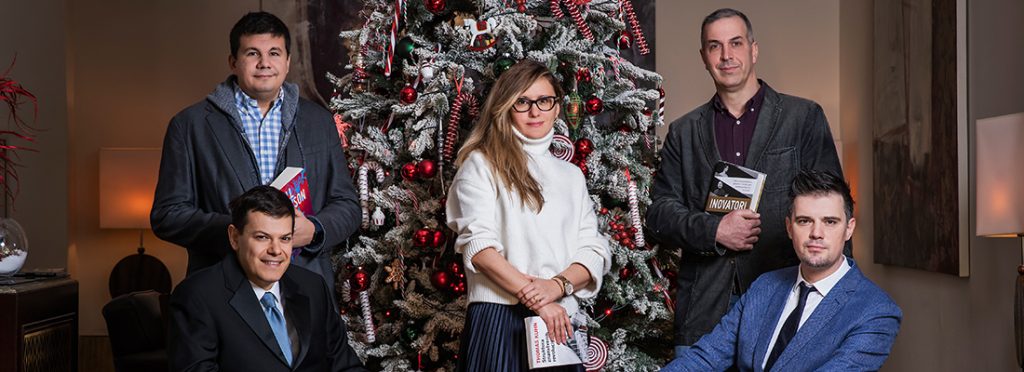In a collaboration between Algebra and digital agency 01 Content & Technology – C3 Croatia, we conceived and launched the campaign “This Christmas I’m reading a book & giving a book for Christmas”. The campaign has been supported by the Croatian Association of Publishers and Booksellers and the Telegram Media Group, while eight companies and organisations have purchased and gifted more than 600 books from the scientists’ List of Top Book Recommendations!
Having access to relevant information is vital. Which is why 12 leading Croatian scientists have selected a little under one hundred titles written by Croatian and world scientists which they consider important. This reliable list of top books for 2021 has been created with the aim of raising awareness of the importance of education and science as part of the initiative “This Christmas I’m reading a book and gifting a book for Christmas”.
Leo Mršić, Algebra University College Vice Dean for Research and Development, highlights that “in a time of data overabundance, that often comes in unstructured forms, books represent a structured element, containing knowledge that helps build the society in which we live. In a mass of short-term values and superficial attention spans, books remind us that science, as our greatest collective endeavor, is built slowly, persistently and through teamwork, and represents one of the most important avenues of knowledge.”
“Being exposed to relevant sources of information and reading many, many books, especially books written by authorities in their fields, people who have devoted their whole lives to researching a single topic in order to gain a deep understanding of it and pass it on to us – is crucial,” says Vuk Vuković, one of the leading junior economists and data scientists, and a co-founder of the British-Croatian startup Oraclum Intelligence Systems, who adds, “Reading and being exposed to ideas we might not even agree with, allows us to step outside of our own cognitive bubbles and advance our critical thinking. Both of these factors are crucial in identifying and defending against false news.”
Bojan Jerbić, Head of the Regional Center of Excellence for Robotic Technology (FESB), points out that scientific thought begins with a question. “The right question is more important than the answer. Is there such a thing as scientific truth? Even if we assume that there is not, the scientists’ mission is to come as close to it as possible. That is why scientific knowledge is the closest thing to the truth as we can get,” says Jerbić and adds, “Information comes from knowledge, but it gains validity once it is written down and books are created.” Iva Tolić, molecular biologist and winner of two scientific Oscars points out that, “By reading books, whether they are literary works or non-fiction volumes and professional monographs, we immerse ourselves in new worlds, explore the unknown and experience adventures in which we find a reflection of ourselves.”
“Critical thinking is one of the most valuable skills nowadays,” stresses Vedran Podobnik, Head of SocialLAB at Faculty of Electrical Engineering and Computing (FER), adding that “reading books is one of the best ways to develop these skills.”
Next to Leo Mršić, Vedran Podobnik, Iva Tolić, Bojan Jerbić and Vuk Vuković, the scientists who have participated in compiling the list of top books are Boris Labar, retired Dean of the Faculty of Medicine, Marin Soljačić, Croatian scientist working at the most prestigious international university of technology, MIT, Ivan Đikić, two-time recipient of the best young investigator award and the AACR Award for outstanding achievements in Cancer Research, Ivana Podnar Žarko, Head of the Internet of Things Laboratory at FER, Pavel Gregurić, a leading Croatian philosopher and author on the classics, Josip Burušić from the Ivo Pilar Institute of Social Sciences and the Centre of Excellence for School Effectiveness and Management (ZCI-SEM) and Darko Marčinko, professor at the Faculty of Medicine and Head of the Psychiatric Clinic at University Hospital Centre in Zagreb.
TAKE A LOOK AT THE LIST OF BOOKS RECOMMENDED BY THESE 12 SCIENTISTS, JOIN OUR CAMPAIGN AND – GIVE A BOOK FOR CHRISTMAS THIS YEAR!
BOOKS TRANSLATED INTO CROATIAN
- Jim Collins, Od dobrog do izvrsnog: Zašto su jedne tvrtke uspješne ... a druge nisu (Zagreb: Binoza press, 2008.)
- Robert Torre, Ima li života prije smrti? (Zagreb: Media bar, 2018.)
- Bill Bryson, Kratka povijest gotovo svega (Zagreb: Planetopija, 2007.)
- Niall Ferguson, Civilizacija: Zapad i ostali (Zagreb: Profil, 2012.)
- Daniel Kahneman, Misliti brzo i sporo (Zagreb: Mozaik knjiga, 2014.)
- Walter Isaacson, Inovatori - Kako je skupina hakera, genijalaca i osobenjaka pokrenula digitalnu revoluciju (Zagreb: Školska knjiga, 2021.)
- Eric Ries, Lean Startup (Zagreb: Mate, 2013.)
- Michael E. Porter, Konkurentska prednost - Postizanje i održavanje vrhunskog poslovanja (Zagreb: Masmedia, 2008.)
- Steven D. Levitt, Frikonomija: Vragolasti ekonomist istražuje drugu stranu medalje (Zagreb: Stanek, 2005.)
- Richard H. Thaler, Nerazumno ponašanje – Stvaranje bihevioralne ekonomije (Zagreb: Školska knjiga, 2020.)
- Robert J. Schiller, George A. Akerlof, Pecanje naivaca: Ekonomika smicalica i prijevare (Zagreb: Znanje, 2017.)
- Robert J. Shiller, Financije i dobro društvo (Zagreb: Mate, 2015.)
- Joseph E. Stiglitz, Cijena profita (Zagreb: Profil, 2020.)
- Amartya Sen, Ideja pravednosti (Zagreb: Naklada Jesenski i Turk, 2017.)
- Amartya Sen, Razvoj kao sloboda (Zagreb: Algoritam, 2012.)
- Daron Acemoglu, James A. Robinson, Zašto nacije propadaju? Izvorišta moći, blagostanja i siromaštva (Zagreb: Mate, 2017.)
- Joel Mokyr, Kultura rasta: Izvorište moderne ekonomije (Zagreb: Mate, 2020.)
- Steven Pinker, Prosvjetiteljstvo našeg doba - Suvremen pogled na razum, znanost, humanizam i napredak (Zagreb: Mozak knjiga, 2019.)
- Mariana Mazzucato, Država poduzetnica (Zagreb: Školska knjiga, 2020.)
- Ivan Krastev, Stephen Holmes, Kraj doba oponašanja - Zašto Zapad gubi bitku za demokraciju (Zagreb: TIM press, 2020.)
- Michael J. Sandel, Što se novcem ne može kupiti (Zagreb: Verbum, 2020.)
- Thomas Piketty, Kapital i ideologija (Zagreb: Profil knjiga, 2020.)
- Timothy Snyder, O tiraniji - Dvadeset lekcija za 20. stoljeće (Zagreb: Naklada ljevak, 2017.)
- Branko Milanović, Dobitnici i gubitnici - Kratka i osebujna povijest globalne nejednakosti (Zagreb: TIM press, 2017.)
- Ian Kershaw, Do nade i natrag – Europa 1950. - 2017. (Zagreb: Fraktura, 2019.)
- Hannah Arendt, Izvori totalitarizma (Zagreb: Disput, 2015.)
- Albert-László Barabási, U mreži: Zašto je sve povezano i kako misliti mrežno u znanosti, poslovanju i svakodnevnom životu (Zagreb: Jesenski i Turk, 2006.)
- Nicholas A. Christakis, James H. Fowler, Povezani: Iznenađujuća moć društvenih mreža i kako one utječu na naše živote (Zagreb: Algoritam, 2010.)
- Darko Marčinko, Miro Jakovljević, Vlasta Rudan, Psihodinamika ljubavi i mržnje (Zagreb: Medicinska naklada, 2019.)
- Aleksandar Durman, Vučedolski Orion i najstariji europski kalendar (Zagreb: Arheološki muzej u Zagrebu, 2000.)
- Carl Sagan, Kozmos (Zagreb: Izvori, 2004.)
- Maja Cigrovski Berković, Lana Ružić, Šećerna bolest i tjelesno vježbanje od A do Ž (Zagreb: Znanje, 2019.)
- Peter J. D'Adamo, Catherine Whitney, Kronični umor: borite se protiv njega prehranom prilagođenom krvnoj grupi (Zagreb: AGM, 2006.)
- Suzanne Steinbaum, Žensko srce - Sveobuhvatni vodič za tjelesno i emocionalno zdravlje srca namijenjen svakoj ženi (Zagreb: Planetopija, 2014.)
- Igor S. Pandžić, Virtualna okruženja (Zagreb: Element, 2004.)
- Mladen Vuković, Matematička logika (Zagreb: Element, 2009.)
- Igor S. Pandžić, Alen Bažant, Željko Ilić, Zdenko Vrdoljak, Mladen Kos, Vjekoslav Sinković, Uvod u teoriju informacije i kodiranje (Zagreb: Element, 2012.)
- Viktor Pinter, Osnove elektrotehnike 1 (Zagreb: Tehnička knjiga, 1994.)
- Leo Budin, Predrag Brođanac, Zlatka Markučič, Smiljana Perić,
- INFORMATIKA 1 - PROGRAMSKI JEZIK PYTHON - udžbenik informatike s dodatnim digitalnim sadržajima za 1. razred prirodoslovno-matematičkih i općih gimnazija te 2. razred klasičnih i jezičnih (Zagreb: Školska knjiga, 2018.)
- Damir Žarko, Branimir Ćućić, Transformatori u teoriji i praksi (Zagreb: Graphis, 2021.)
- Vedran Mornar, Uvod u programiranje (Zagreb: Element 2021.)
- Alen Bažant, Branko Mikac, Gordan Gledec, Gordan Ježić, Ignac Lovrek, Maja Matijašević, Marijan Kunštić, Mladen Kos, Vjekoslav Sinković, Željko Ilić, Osnovne arhitekture mreža (Zagreb: Element, 2014.)
- Anita Peti-Stantić, Vedrana Stantić (ur.), Putovanje u nepoznato - Zašto se bavim znanošću (i kako je do toga došlo)? (Zagreb: Naklada Ljevak, 2021.)
- Paolo Rossi, Rođenje novovjekovne znanosti u Europi (Zagreb: In.Tri, 2019.)
- Jerry A. Coyne, Zašto je evolucija istinita (Zagreb: In.Tri, 2016.)
- Carlo Rovelli, Sedam kratkih lekcija iz fizike (Zagreb: Vuković i Runjić, 2017.)
- Yuval Noah Harari, Sapiens - Kratka povijest čovječanstva (Zagreb: Fokus komunikacije, 2015.)
- Daniel C. Dennett, Vrste umova - k razumijevanju svijesti (Zagreb: In.Tri, 2016.)
- Geoffrey Miller, Razum i razmnožavanje - Kako je izbor partnera oblikovao evoluciju ljudske naravi (Zagreb: In.Tri, 2021.)
- Ben Goldacre, Loša znanost (Zagreb: Naklada OceanMore, 2010.)
- Nenad Trinajstić, Život u znanosti – Uspomene iz nepovrata (Zagreb: HAZU, 2016.)
- Nenad Trinajstić, 100 hrvatskih kemičara (Zagreb: Školska knjiga, 2002.)
- Igor Rudan, Točna boja neba - Razmišljanja o znanosti u 21. stoljeću (Zagreb: Knjižara Ljevak, 2017.)
- Miroslav Radman, Daniel Carton, Na putu do zdrave dugovječnosti: Možemo li ovladati našim biološkim ograničenjima? (Zagreb: Profil, 2012.)
- James Lovelock, Geja: novi pogled na život Zemlje (Zagreb: Izvori, 2005.)
- Richard Dawkins, Najveća predstava na Zemlji: Dokazi u prilog evoluciji (Zagreb: Izvori, 2009.)
- David Attenborough, Život na našem planetu – Moje svjedočanstvo i vizija budućnosti (Zagreb: Školska knjiga, 2020.)
- Thomas Kuhn, Struktura znanstvenih revolucija (Zagreb: Jesenski i Turk, 2013.)
- Erwin Schrödinger, Što je život?: Fizičke značajke žive stanice (Zagreb: Izvori, 2012.)
- Michael W. Berns, Stanice (Zagreb: Školska knjiga, 1997.)
- Josip Burušić, Vesna Šerepac, STEM DAROVITI I TALENTIRANI UČENICI: identifikacija, metode nastavnog rada i profesionalno usmjeravanje (Zagreb: Alfa, 2019.)
- Siniša Brlas, Terminološki opisni rječnik ovisnosti (Zagreb: Medicinska naklada, 2017.)
- Beata Bagi, Ožiljci: Priče iz američke sudnice (Zagreb: Medicinska naklada, 2021.)
- Marko Jukić, Liječničke pogreške - Osnovana sumnja (Zagreb: Medicinska naklada, 2014.)
- Ante Ljubičić, Liječnik vam savjetuje: Kako sačuvati zdravlje i pobijediti bolest (Zagreb: Medicinska naklada, 2017.)
- Brian Greene, Elegantni svemir - Superstrune, skrivene dimenzije i potraga za konačnom teorijom (Zagreb: Jesenski i Turk, 2014.)
- Jo James, Beth Cotton, Jules Knight, Rita Freyne, Najbolja skrb za osobe s demencijom u bolničkim uvjetima (Zagreb: Medicinska naklada, 2018.)
- Davor Štimac i suradnici, Debljina - klinički pristup (Zagreb: Medicinska naklada, 2017.)
- Mayo Clinic, Tjelovježba za svakoga (Zagreb: Medicinska naklada, 2010.)
- Daniel C. Dennett, Darwinova opasna ideja - Evolucija i smisao života (Zagreb: In.Tri, 2020.)
- Igor Rudan, Zao zrak - Razmišljanja o zdravlju i bolesti u 21. stoljeću (Zagreb: Naklada Ljevak, 2018.)
- James Nestor, Dah - Nova znanost o izgubljenom umijeću disanja (Zagreb: Planetopija, 2021.)
BOOKS NOT TRANSLATED INTO CROATIAN
- Max Tegmark, Life 3.0: Being Human in the Age of Artificial Intelligence (2017.)
- Byron Reese, The Fourth Age: Smart Robots, Conscious Computers, and the Future of Humanity (2018.)
- Ray Kurzweil, The Singularity Is Near: When Humans Transcend Biology (2005.)
- Marvin Minsky, The Society of Mind (1985.)
- François Chollet, J. J. Allaire, Deep Learning with R (2018.)
- Clayton Christensen, The Innovator's Dilemma (1997.)
- Clayton Christensen, Michael E. Raynor, The Innovator's Solution: Creating and Sustaining Successful Growth (2003.)
- Geoffrey Moore, Crossing the Chasm (1991.)
- Matthew O. Jackson, Social and Economic Networks (2008.)
- Erik Brynjolfsson, Andrew Mcafee, The Second Machine Age: Work, Progress, and Prosperity in a Time of Brilliant Technologies (2014.)
- Hannah Fry, Hello World: How to be Human in the Age of the Machine (2018)
- Stuart Russell, Peter Norvig, Artificial Intelligence: A modern approach (4th edition) (2020.)
- Darryl Cunningham, Graphic Science (2017.)
- William Myers, Paola Antonelli, Bio Design: Nature, Science, Creativity (2012.)
- Paul Hawken, Regeneration: Ending the Climate Crisis in One Generation (2021.)
- Vandana Shiva, Kartikey Shiva, Oneness vs the 1%: Shattering Illusions, Seeding Freedom (2018.)
- Vandana Shiva, Sacred Seed (2014.)
- Robert Axelrod, The Evolution of Cooperation (1984.)
- Rizwan Virk, The Simulation Hypothesis: An MIT Computer Scientist Shows Why AI, Quantum Physics, and Eastern Mystics All Agree We Are In A Video Game (2019.)
- Rizwan Virk, The Simulated Multiverse: An MIT Computer Scientist Explores Parallel Universes, The Simulation Hypothesis, Quantum Computing and the Mandela Effect (2021.)
- Sinan Aral, The Hype Machine: How Social Media Disrupts Our Elections, Our Economy, and Our Health-and How We Must Adapt (2020.)





